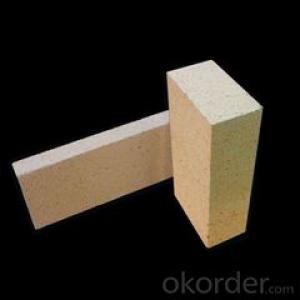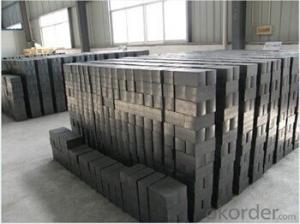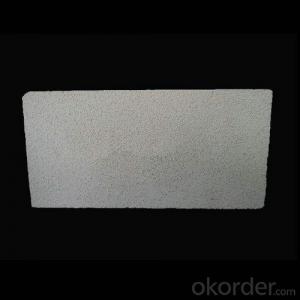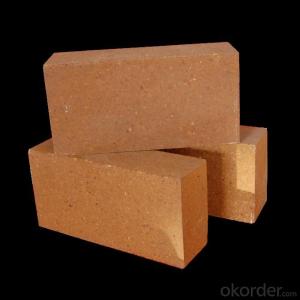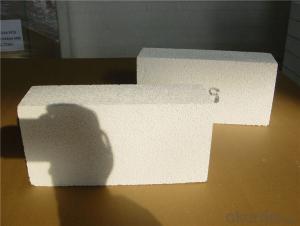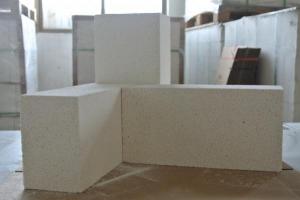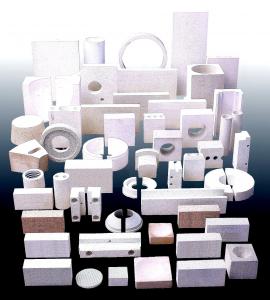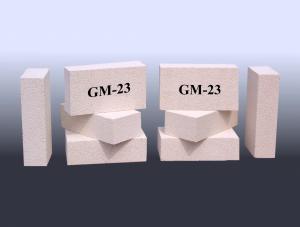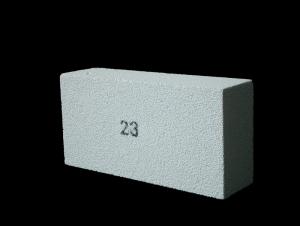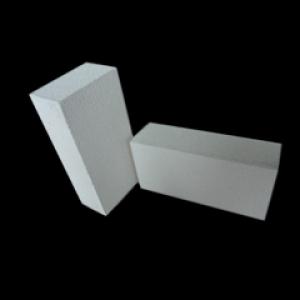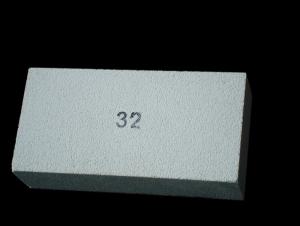Mullite Refractory Brick Lightweight Insulation Brick White Brick
- Loading Port:
- Shanghai
- Payment Terms:
- TT OR LC
- Min Order Qty:
- 10 m.t.
- Supply Capability:
- 100 m.t./month
OKorder Service Pledge
OKorder Financial Service
You Might Also Like
Quick Details
| Place of Origin: | Brick | Refractoriness (Degree): | Common (1580°< Refractoriness< 1770°) | |
| Brand Name: |
Packaging & Delivery
| Packaging Detail: | 1.fumigated wooden pallet with polyethylene film and steel straps 2.as customers' requirements |
| Delivery Detail: | according to the contracts |
Product Description
Mullite brick is a kind of product made of best quality mullite. This product has features of good
chemical stability, high load softening temperature and good thermal shock stability, etc. It is an important kind of refractory product used in metallurgy, construction material, electric industries, etc.
Sintered Mullite Brick | |||
M-65 | M-75 | M-80 | |
Al2O3 (%) | 65 | 75 | 80 |
Refractoriness (℃) | 1850 | 1850 | 1850 |
Apparent Porosity (%) | 19 | 20 | 21 |
Bulk Density (g/cm3) | 2.5 | 2.6 | 2.7 |
Refractoriness Under Load (℃) | 1580 | 1600 | 1630 |
Atmospheric Pressure Strength(MPa) | 55 | 60 | 60 |
Light Weight Heat Insulation Brick | |||
MD-1300 | MD-1450 | MD-1550 | |
Al2O3 (%) | >40 | >50 | >65 |
SiO2 (%) | 55-60 | 40-50 | 30-35 |
Fe2O3(%) | <1 | <1 | <1 |
Host Lattice | Mullite | Mullite | Mullite |
Thermal Conductivity(w/m.k 400℃) | 0.2-0.3 | 0.2-0.3 | 0.3-0.35 |
Bulk Density (g/cm3) | 0.8-0.9 | 0.8-1.0 | 1.0-1.2 |
Atmospheric Pressure Strength (MPa) | ≥2.5 | ≥3.0 | ≥5.0 |
Refractoriness Under Load (KD℃) | >1300 | >1410 | >1520 |
Safe Working Temperature (℃) | 1300 | 1450 | 1550 |
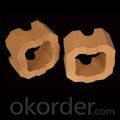
Our Services
1. We will reply to you immediately.
2. Our products will be made according to your index.
3. Other details could be discussed according to customers’ requirements.
FAQ
1. What’s the payment?
Usually T/T, others could be discussed.
2. When will you deliver the goods?
The delivery time will be determined according to the quantity of the order.
3. Do you provide samples?
Yes, samples are available.
4. How are your products’ quality?
The products will be strictly inspected before shipment, so the quality could be guaranteed.
5. Do you accept OEM?
Yes, we can do OEM.
- Q:Are insulating fire bricks resistant to oil and gas?
- Yes, insulating fire bricks are generally resistant to oil and gas. These bricks are designed to withstand high temperatures and are commonly used in applications where they may come into contact with oil and gas, such as furnaces and kilns. However, it is important to note that the specific type and composition of the fire bricks can affect their resistance, so it is always recommended to consult the manufacturer's specifications for detailed information.
- Q:Is sintering insulation brick good or concrete porous brick good?
- Strength and fastness are, of course, porous bricks.
- Q:Are insulating fire bricks resistant to thermal fatigue?
- Insulating fire bricks exhibit remarkable resistance to thermal fatigue. These bricks are purposefully engineered to endure elevated temperatures and thermal cycling without experiencing any cracks or fractures. Composed of refractory materials with exceptional thermal shock resistance, they possess the ability to expand and contract without suffering significant harm. This capacity to withstand thermal fatigue renders insulating fire bricks highly suitable for applications involving extreme temperature fluctuations, such as kilns, furnaces, and other environments with high temperatures.
- Q:Can insulating fire bricks be used in ceramic fiber modules?
- No, insulating fire bricks cannot be used in ceramic fiber modules. Ceramic fiber modules are typically made from refractory ceramic fibers, which are lightweight and have excellent insulating properties. Insulating fire bricks, on the other hand, are dense bricks made from refractory materials like clay or silica, and they are not flexible or adaptable like ceramic fiber modules.
- Q:Can insulating fire bricks be cut or shaped as needed?
- Yes, insulating fire bricks can be cut or shaped as needed. They are typically made from lightweight materials such as ceramic fibers, which can be easily cut using a saw or other cutting tools. Additionally, they can be shaped using a knife or sandpaper to achieve the desired form.
- Q:How do insulating fire bricks affect heating or cooling times?
- Insulating fire bricks help to reduce heating or cooling times by providing excellent thermal insulation. They have low thermal conductivity, which means they minimize heat transfer between the hot or cold surface and the surrounding environment. As a result, insulating fire bricks can effectively retain heat or coldness, allowing for faster heating or cooling of the desired area.
- Q:What kind of mortar is used to bond insulating fire bricks together?
- The most common type of mortar used to bond insulating fire bricks together is refractory mortar. Refractory mortar is specifically designed to withstand high temperatures and provide excellent adhesion properties for firebrick applications. It is composed of a mixture of high-temperature resistant materials such as silica, alumina, and fire clay. This type of mortar is highly resistant to thermal shock and can withstand extreme temperatures, making it ideal for bonding insulating fire bricks that are used in furnaces, kilns, and other high-temperature applications.
- Q:Can insulating fire bricks be used in heat treatment furnaces?
- Yes, insulating fire bricks can be used in heat treatment furnaces. Insulating fire bricks are designed to withstand high temperatures and provide excellent insulation properties, making them suitable for use in heat treatment furnaces where high temperatures are required. These bricks help to retain heat, minimize energy loss, and ensure efficient heat distribution throughout the furnace, resulting in improved heat treatment processes.
- Q:Can insulating fire bricks be used for insulation in cold storage facilities?
- Yes, insulating fire bricks can be used for insulation in cold storage facilities. Insulating fire bricks are made from lightweight materials with high insulating properties, such as ceramic or refractory fibers. They have low thermal conductivity, which means they can effectively prevent heat transfer and maintain a stable temperature inside the cold storage facility. The bricks are also resistant to extreme cold temperatures and can withstand thermal shock, making them suitable for use in cold storage applications. Additionally, insulating fire bricks are durable and can provide long-term insulation, reducing energy consumption and maintaining the desired temperature for storing perishable goods.
- Q:Can activated carbon be antiseptic?
- Activated carbon is mainly with adsorption properties, there is no direct anti-corrosion effect.
1. Manufacturer Overview |
|
|---|---|
| Location | |
| Year Established | |
| Annual Output Value | |
| Main Markets | |
| Company Certifications | |
2. Manufacturer Certificates |
|
|---|---|
| a) Certification Name | |
| Range | |
| Reference | |
| Validity Period | |
3. Manufacturer Capability |
|
|---|---|
| a)Trade Capacity | |
| Nearest Port | |
| Export Percentage | |
| No.of Employees in Trade Department | |
| Language Spoken: | |
| b)Factory Information | |
| Factory Size: | |
| No. of Production Lines | |
| Contract Manufacturing | |
| Product Price Range | |
Send your message to us
Mullite Refractory Brick Lightweight Insulation Brick White Brick
- Loading Port:
- Shanghai
- Payment Terms:
- TT OR LC
- Min Order Qty:
- 10 m.t.
- Supply Capability:
- 100 m.t./month
OKorder Service Pledge
OKorder Financial Service
Similar products
New products
Hot products
Related keywords
